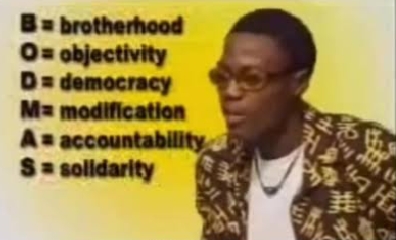There is a kind of song that doesn’t simply play. It confronts. It calculates. It holds up a mirror to a society that would rather look away. Mathematics, by Sound Sultan, is such a song. It doesn’t begin with an overt warning. It starts in the classroom of life, quietly counting the variables of existence—poverty, corruption, apathy, ambition, survival. Each beat, each rhyme, each repetition is a number in an equation Nigeria still struggles to solve.
- The Artist Who Counted Society’s Sums
- The Classroom of Life: Sound Sultan’s Lesson Begins
- Repetition as Reflection: Musical Reinforcement
- Real-Life Reflections: The 2025 Nigerian Context
- The Song’s Lasting Influence on Nigerian Music and Society
- Musical Evolution and Contributions: From Afrobeat to Advocacy
- Legacy and Impact: The Moral Compass of Nigerian Music
- The Unfinished Equation: Nigeria in 2025
- Eternal Reflection: The Moral Ledger Left Open
Listening to it today, in 2025, is like revisiting a ledger left open on a desk decades ago. The sums never add up. The “answers” Sound Sultan highlighted—the inequalities, the injustices, the moral debts—remain unpaid. And yet, there is a rhythm to this reckoning, a human pulse that refuses to be ignored.
This article is a journey through that musical equation, a verse-by-verse examination of how Mathematics holds a mirror to Nigeria, dissecting its lyrics, its metaphors, and the truths buried in its rhythm. It is a warning, a lesson, and, perhaps, a call to action.
The Artist Who Counted Society’s Sums

Olanrewaju Abdul-Ganiu Fasasi, known professionally as Sound Sultan, was born on November 27, 1976, in Jos, Plateau State, Nigeria. He was the fourth of six children in his family. His parents, Fasasi Liadi Alarape and Adeyinka Ajarat Fasasi, provided a nurturing environment that allowed his talents to flourish.
I) Early Education and Musical Influences
Sound Sultan began his educational journey at Stepping Stone Nursery and Primary School in Lagos from 1981 to 1987. He continued his secondary education at Federal Government College, Ogbomoso, from 1988 to 1993. In 1999, he graduated with a Bachelor of Science degree in Geography and Regional Planning from Lagos State University (LASU) .
His musical inclinations were evident early on. In 1991, he developed an interest in music, participating in school parties and writing his own lyrics. He often credited his elder brother, Baba Dee, who studied theatre arts, as a significant influence on his artistic journey .
II) Rise to Prominence
Sound Sultan’s career in the entertainment industry began in the 1990s. To fund his studio sessions, he organized shows and performances. His breakthrough came in 1999 when he won the Benson & Hedges ‘Grab the Mic’ Talent Hunt, which propelled him into the limelight .
In 2000, he released his first single, “Mathematics (Jagbajantis),” which became a hit in Nigeria. This track showcased his unique style of blending social commentary with music, a hallmark of his career.
The Classroom of Life: Sound Sultan’s Lesson Begins
I) Setting the Stage: Sound Sultan as the Unconventional Teacher
Sound Sultan begins Mathematics by assuming the role of a teacher. But this is no ordinary classroom. His stage is the streets, the markets, the homes, the hearts of every Nigerian who has struggled to reconcile life’s inequities.
“All stand, greet.
Good morning sir!
Welcome to Jagbajantis High School.
My name is Sound Sultan, your new mathematics teacher.”
Here, the lyrical choice does more than entertain. It positions the artist as a guide through the arithmetic of morality and society. The classroom metaphor allows him to teach complex social equations in a form that is immediately accessible, blending education with artistry.
The pedagogical setup also introduces the central conceit of the song: life, in Nigeria, is an equation where the variables are human choices, systemic failures, and cultural contradictions. The challenge is learning to calculate consequences, not just memorize rules.
II) Multiplying Misdeeds: A Lesson on Compounded Consequences
The first verse introduces a theme that recurs throughout the song: the multiplication of societal sins. Sound Sultan repeatedly frames human wrongdoing as a numerical operation, emphasizing the exponential impact of corruption, greed, and moral negligence:
“People of this world, them plenty.
Sins of these people many, so many.
Many times plenty, multiply am…
The answer you get na wetin dey make poor man dey cry.”
This repetition functions as both didactic and musical emphasis, reinforcing that the “sums” of human misbehavior are not static. When injustice and greed accumulate, they compound the suffering of the vulnerable.

Here, the song does something extraordinary: it converts abstract social critique into tangible arithmetic. It is a moral calculus rendered in rhythm—a ledger where each line is an entry in the account of society.
III) Wealth and Woe: Subtracting the Poor, Adding the Rich
One of the most striking elements of Mathematics is its commentary on economic inequality. Sound Sultan draws a direct line between wealth concentration and human suffering:
“The answer you get na wetin dey make poor man dey cry.
The answer you get na wetin dey make rich man dey mess and leaders dey lie.”
The lyric is simple but devastating. While the poor are burdened by systemic neglect, the rich thrive—often at the expense of society. In numerical terms, the “equation” is rigged: resources are subtracted from those who need them most, while power and opportunity are disproportionately added to those who already hold them.
This is humanized arithmetic: Sound Sultan doesn’t just cite statistics—he translates numbers into lived experience. Every “sum” reflects a personal story of struggle, hunger, and frustration.
IV) Corruption as Multiplication: How Society Adds Up Wrong
The song’s subsequent lines extend the metaphor of arithmetic to corruption, crime, and moral decay:
“The answer you get na wetin dey make young boys and girls join bad gang.
The answer you get na wetin dey make innocent man rot inside jail.”
Here, Sound Sultan charts the ripple effect of systemic failure. Corruption doesn’t exist in isolation; it multiplies. The misdeeds of a few influence the trajectory of many—youth drawn into crime, the innocent punished, society destabilized.
By framing corruption as a multiplication problem, Sultan makes the listener visualize the exponential consequences of ethical negligence. This is a lesson in cause and effect, morality and accountability, wrapped in musical form.
V) BODMAS for Society: Rewriting the Equation
One of the most ingenious aspects of Maths is Sound Sultan’s use of BODMAS—a familiar mathematical mnemonic for the order of operations—as a framework for moral and civic guidance. In the final verses, he transforms a classroom tool into a blueprint for societal reform:
“Oyinbo say, Na BODMAS we go use take, solve mathematics.
So follow Jagbajantis. Oya carry biro.
B for brotherhood.
O for objectivity.
D for democracy.
M for modification.
A for accountability.
S for Solidarity.”
This is not just playful wordplay. Each letter represents a value necessary for societal balance, echoing through governance, community, and personal conduct. In 2025, Nigeria continues to wrestle with deficiencies in each of these areas.
Brotherhood (B): Despite ethnic and regional diversity, national unity remains aspirational. Sound Sultan reminds us that societal cohesion is foundational to solving bigger equations.
Objectivity (O): Bias, favoritism, and nepotism distort judgment in both governance and daily life. Objectivity is the divisor that ensures fairness.
Democracy (D): Voting and leadership structures are meant to distribute power equitably. Yet, electoral irregularities and civic disengagement remain persistent problems.
Modification (M): Adjusting policies, behaviors, and societal norms is essential to adapt to evolving challenges and ensure sustainable progress.
Accountability (A): Leaders and institutions must answer for their actions; without this, corruption multiplies unchecked.
Solidarity (S): True service prioritizes collective good over individual gain—a principle consistently challenged in contemporary Nigeria.

By overlaying BODMAS onto society, Sultan teaches that moral operations must follow a structured order. Miss a step, and the equation collapses—a lesson still relevant decades later.
Repetition as Reflection: Musical Reinforcement
Throughout Mathematics, Sound Sultan’s repetition functions both as a musical device and as pedagogical reinforcement. By repeating phrases like “multiply am” or “the answer you get na…,” he ensures that the message sticks, mirroring how lessons must be practiced to be understood.
This technique also reflects a psychology of awareness: societal problems are persistent and repetitive. They must be acknowledged multiple times before change can take root. It’s as if the listener is participating in an ongoing classroom exercise—an ethical drill that never ends.
Real-Life Reflections: The 2025 Nigerian Context
While the song was first released decades ago, its relevance persists:
Economic Inequality: Nigeria’s wealth gap remains among the highest globally, with billionaires coexisting alongside widespread poverty. The song’s arithmetic of “subtract the poor, add the rich” still holds.
Youth Unemployment and Crime: With millions of young Nigerians underemployed, the “young boys and girls joining gangs” equation is sadly observable.
Corruption and Accountability: Political graft continues to undermine governance, reflecting the “leaders dey lie” motif.
Moral Erosion and Social Values: Ethical lapses in public and private spheres mirror the moral equations Sound Sultan warned about.
By placing Maths within this contemporary framework, the song becomes both historical artifact and living warning, a ledger that continues to tally the sums of societal choices.
The Song’s Lasting Influence on Nigerian Music and Society
Beyond its immediate lessons, Maths has influenced generations of artists and activists:
Musical Pedagogy: Nigerian musicians increasingly incorporate social critique into rhythmic storytelling.
Youth Activism: The song encourages questioning of authority, awareness of social inequities, and moral responsibility.
Legacy of Reflection: Decades later, Maths continues to be cited in discussions on governance, youth unemployment, and corruption, cementing its status as both art and social critique.

Sultan’s work demonstrates that music can simultaneously entertain, educate, and provoke societal reflection, a rare feat in any national context.
Musical Evolution and Contributions: From Afrobeat to Advocacy
Over the years, Sound Sultan’s music evolved far beyond conventional boundaries, traversing genres such as R&B, hip hop, reggae, and Afrobeat. This versatility was not just stylistic; it was a strategic vehicle for storytelling and social commentary. While the melodies could be infectious and the rhythm danceable, the lyrics often carried subversive and reflective messages, addressing some of the most pressing societal issues in Nigeria. Poverty, corruption, bad governance, and youth disenchantment were recurring themes—each song acting as a mirror held up to the nation’s conscience.
For instance, songs like ‘Mathematics’ and ‘Motherhood’ blended catchy hooks with ethical reflection, transforming entertainment into education. Sultan’s approach mirrored that of African griots, who historically used music to transmit history, values, and social critique. He transformed pop culture into a pedagogical tool, challenging listeners not only to move their bodies but also to move their thinking.
In 2007, the co-founding of Naija Ninjas with his brother Baba Dee marked another milestone in his career. This record label and production company was both a creative incubator and a mentoring hub, providing a platform for emerging Nigerian artists to hone their craft while being exposed to Sultan’s ethos of socially conscious artistry. Albums released under the label were not just commercial ventures—they were cultural statements, embedding civic consciousness into the very fabric of modern Nigerian music.
Beyond music production, Sultan’s influence shaped artist identity in Nigeria. He encouraged upcoming talents to see themselves as not merely entertainers but as cultural commentators and ethical voices within their communities. This mentorship extended his impact far beyond his own discography, creating a ripple effect in the Nigerian entertainment industry.
Legacy and Impact: The Moral Compass of Nigerian Music
Sound Sultan’s influence extended beyond beats and lyrics. In 2012, his appointment as a United Nations Peace Ambassador recognized his efforts in promoting peace, unity, and ethical reflection through music. His advocacy work underscored a broader vision: artists could be agents of societal change, shaping public consciousness while challenging systemic inequities.
His contributions to the Nigerian entertainment industry were multifaceted. He played a critical role in bridging traditional African musical elements with contemporary global sounds, creating a hybrid language that resonated locally and internationally. Beyond the studio, he championed ethical storytelling, advocating for narratives that interrogated societal flaws rather than simply entertaining.
The death of Sound Sultan on July 11, 2021, in New Jersey, USA, from Angioimmunoblastic T-cell lymphoma, a rare form of cancer, was a profound loss. Tributes poured in from across the world, reflecting not just admiration for his musical craft but respect for his moral vision. For the Nigerian music industry, it marked the loss of a cultural strategist, a mentor, and a moral compass—someone who used artistry to illuminate societal blind spots. His death underscored the fragility of life and the enduring importance of socially conscious art.
The Unfinished Equation: Nigeria in 2025
Nearly two decades after Mathematics first challenged Nigerians to audit their ethical and social choices, the sums remain unresolved. Sultan’s lyrics, though over twenty years old, continue to resonate because the societal variables he analyzed have persisted—and in some cases, intensified.
Economic Inequities: Wealth disparity continues to widen. Reports from the National Bureau of Statistics show that the richest 10% of Nigerians control over 50% of the nation’s wealth, while millions live below the poverty line. Sultan’s moral arithmetic foresaw this imbalance, warning that unchecked wealth accumulation without accountability distorts the national equation.
Youth Disillusionment: High unemployment, limited access to quality education, and underfunded vocational programs create fertile ground for frustration. Sultan’s metaphoric equation—linking social neglect to youth crime—remains tragically relevant. Millions of young Nigerians continue to struggle to find their place in a society that promises opportunity but often delivers barriers.
Corruption and Ethical Lapses: Leadership failures, both in public service and private enterprise, perpetuate cycles of inequity. Sultan’s call for brotherhood, accountability, democracy, morality, and selflessness acts as a moral formula for societal repair, yet consistent application remains insufficient. Each unaddressed variable multiplies the societal imbalance, echoing the multiplier effect he warned about decades ago.
The brilliance of Mathematics lies in its timeless diagnostic power. It does not merely entertain; it audits the moral and civic decisions of a nation. The equations are unsolved, not because solutions are impossible, but because systemic application of ethical principles has been inconsistent. Sultan’s work remains both a mirror and a blueprint—reflecting societal flaws while offering a framework for moral recalibration.

In 2025, his song still challenges Nigerians: can the country solve the sum? Can wealth, governance, youth opportunity, and ethical leadership be recalibrated to produce a balanced, equitable outcome? While Sound Sultan is gone, the ledger he left open invites the living to complete the calculations. His music is no longer just art—it is an enduring civic audit, a call for reflection, and a blueprint for societal equilibrium.
Eternal Reflection: The Moral Ledger Left Open
Mathematics is more than a song; it is a ledger of human behavior, a classroom for societal reflection, and a blueprint for moral accountability. By framing Nigeria’s challenges in arithmetic, Sound Sultan created a space for introspection that is both accessible and urgent.
The “answers” the song seeks are not found in textbooks, elections, or reports—they reside in human choice, ethical reflection, and collective action. Like any complex equation, solving it requires patience, diligence, and willingness to follow the order of operations laid out in the song: BODMAS for society.
In 2025, the ledger is still open, the sums still unsettled. Yet, the classroom door remains ajar, inviting every citizen to pick up the pen, carry the biro, and attempt to balance the equation. Sound Sultan’s voice echoes across decades, reminding Nigeria that the solution is as much in our hands as it is in our conscience.













